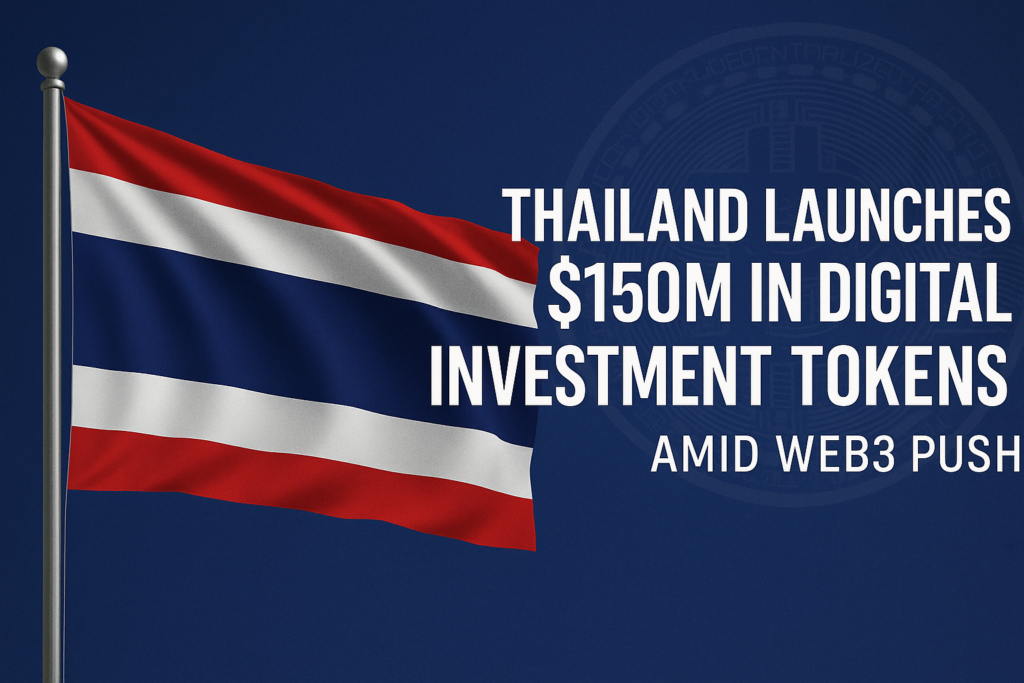
What to know
- Thailand’s Finance Ministry approved a $150M digital token issuance by Gulf Energy-linked RealX.
- The tokens will be offered under the Royal Decree on Digital Asset Businesses, not traditional securities law.
- Thailand’s move marks a growing trend in Asia toward blockchain-based fundraising and Web3 integration.
- The government seeks to attract new-generation investors while bypassing legacy financial intermediaries.
Thailand Issues $150M in Digital Tokens, Accelerating Blockchain-Backed Fundraising
Thailand is taking a bold step into the tokenized investment era, with the country’s Finance Ministry approving the issuance of 5 billion baht (roughly $150 million) worth of digital investment tokens, marking one of the region’s most significant state-endorsed blockchain finance initiatives to date.
The green light was given to RealX, a joint venture tied to Gulf Energy Development — one of Thailand’s largest energy companies. RealX is leveraging blockchain to issue digital tokens that represent ownership in real estate projects, bypassing traditional securities regulations and instead operating under the Royal Decree on Digital Asset Businesses.
This distinction is key: rather than being governed by the Thai Securities and Exchange Commission (SEC) under traditional capital market laws, these tokens are regulated by the Ministry of Finance under digital asset frameworks. This shift not only underscores Thailand’s evolving stance on tokenized finance but signals a broader governmental strategy to embrace Web3 infrastructure and attract younger, crypto-savvy investors.
Why This Matters for Global Crypto and Web3
Thailand’s $150M digital token issuance comes amid a growing regional competition to become Asia’s blockchain capital. While Hong Kong is pushing crypto ETFs and Singapore is tightening compliance, Thailand is betting big on tokenized real-world assets (RWAs) and public-private blockchain partnerships.
By allowing digital investment tokens to function outside the traditional securities sandbox, Thailand is enabling a more agile, blockchain-native fundraising environment, which could prove essential for the country’s emerging digital economy.
“Thailand is trying to leapfrog traditional finance and go straight into decentralized digital infrastructure,” said an analyst familiar with the development. “This is a clear signal that ASEAN markets are waking up to the efficiency and accessibility offered by Web3 capital markets.”
A Web3-Ready Regulatory Framework
The RealX tokens will be launched using a private-public blockchain model, giving them verifiable on-chain transparency while also ensuring regulatory compliance with Thailand’s evolving digital asset laws.
Notably, these tokens will be sold to both institutional and retail investors, targeting a younger demographic that is already familiar with digital assets. Thailand’s Ministry of Finance has made it clear that this model — distinct from initial coin offerings (ICOs) of the past — will provide legal investor protections while also encouraging broader adoption of tokenized capital markets.
The country’s legal framework allows for digital investment tokens to be structured much like real estate investment trusts (REITs), offering passive income via yield-sharing mechanisms encoded directly into the smart contracts. This aligns with global trends, as tokenized RWAs — from real estate to art and infrastructure — are gaining traction in both developed and emerging markets.
Broader Trend: Southeast Asia’s Blockchain Renaissance
Thailand’s move mirrors similar initiatives across Southeast Asia, where governments are experimenting with tokenized bonds, digital securities, and stablecoin integration. The Bank of Thailand is already exploring wholesale CBDCs, while private players like SCB TechX are building blockchain infrastructure for trade finance and cross-border payments.
The $150M issuance may just be the beginning. Gulf Energy’s deeper involvement suggests that larger institutional players could soon follow suit, potentially tokenizing infrastructure, energy, and logistics projects.
If successful, Thailand could position itself as a Web3-friendly financial hub, attracting global investors and blockchain developers looking for regulatory clarity and innovation-ready ecosystems.

